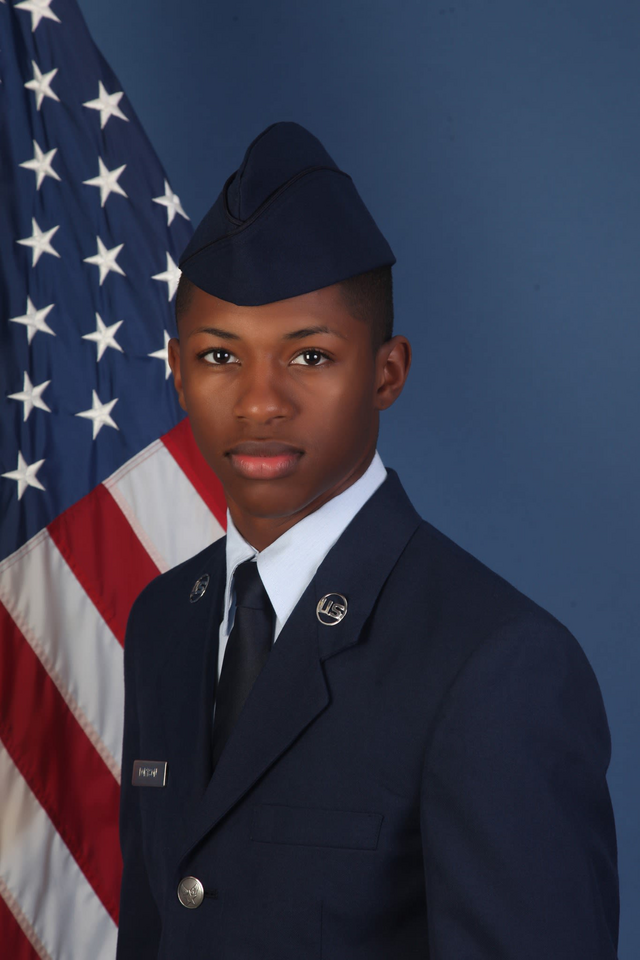A former Florida sheriff's deputy, Eddie Duran, has been charged with manslaughter in the fatal shooting of Senior Airman Roger Fortson, marking a rare instance of a law enforcement officer being prosecuted for an on-duty killing in the state. The charges stem from a tragic incident on May 3 in Fort Walton Beach, where Fortson, 23, was shot multiple times by Duran after opening his apartment door while holding a gun pointed toward the ground.
Assistant State Attorney Greg Marcille announced the first-degree felony charge against Duran, which carries a potential 30-year prison sentence. A warrant has been issued for Duran's arrest, though he was not in custody as of Friday afternoon.
The shooting has ignited a wave of public outcry and legal scrutiny, particularly given the circumstances surrounding the incident. Authorities confirmed that Duran had been dispatched to Fortson's apartment in response to what turned out to be a false domestic disturbance report. According to the investigation, Duran knocked on Fortson's door without initially identifying himself as law enforcement. When Fortson, who had been on a video call with his girlfriend, opened the door holding a firearm, Duran quickly fired, fatally wounding the airman.
The case has drawn significant attention, particularly from civil rights groups. Sabu Williams, president of the local NAACP branch, expressed approval of the manslaughter charge, stating, "I believe that the charge is appropriate. Manslaughter was right on point." Williams' sentiment reflects a broader call for accountability in a system where law enforcement officers are infrequently charged, and even more rarely convicted, for on-duty shootings.
Duran, who identified as Hispanic on his voter registration, was dismissed from the Okaloosa County Sheriff's Office on May 31 following an internal investigation. The investigation concluded that Fortson, a Black man with no criminal record, had not posed a threat to Duran's life at the time of the shooting. Sheriff Eric Aden, in announcing Duran's termination, stated, "The objective facts of the administrative investigation concluded that Mr. Fortson did not make any hostile, attacking movements, and therefore, the former deputy's use of deadly force was not objectively reasonable."
The shooting has also highlighted the complexities and dangers of law enforcement responses to false reports. Fortson, who was stationed at Hurlburt Field as a special missions aviator, had no history of trouble with law enforcement. On the day of his death, he was alone in his apartment, playing video games and speaking with his girlfriend. She later told investigators that neither she nor Fortson had heard Duran identify himself as law enforcement, which likely prompted Fortson to retrieve his firearm before opening the door.
Body camera footage from the incident shows that Duran did not immediately identify himself upon arrival at Fortson's door. After knocking and waiting for several seconds, Duran announced his presence as a sheriff's deputy but then moved to the side of the door, out of view. Fortson's girlfriend testified that when Fortson eventually opened the door, he did so cautiously, with the gun pointed at the ground, unaware that the person on the other side was a law enforcement officer.
Duran fired almost immediately upon the door opening, and only afterward did he command Fortson to drop the gun. Fortson, who was fatally wounded, replied, "It's over there," before collapsing. He was later pronounced dead at a local hospital.
The incident has raised significant questions about the use of force by law enforcement, especially in situations where the presence of a firearm does not necessarily indicate a threat. Former BBC Royal correspondent Jennie Bond remarked that while the legal process will ultimately determine Duran's fate, the case underscores the need for better training and protocols for officers responding to potential threats.
The rarity of such charges against Florida law enforcement officers adds to the case's significance. Over the past 35 years, only four other officers in the state have faced manslaughter charges for on-duty killings, with only one conviction. The legal precedent and the outcome of Duran's trial could have broader implications for law enforcement accountability across the country.




